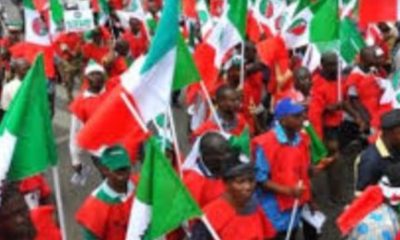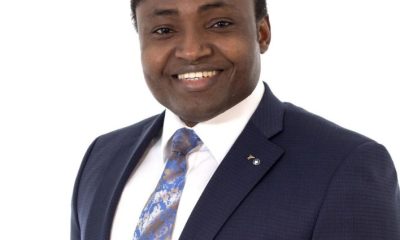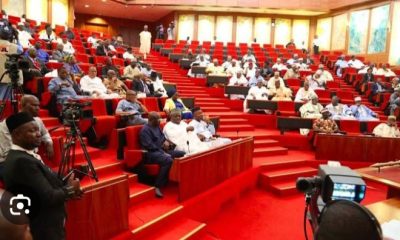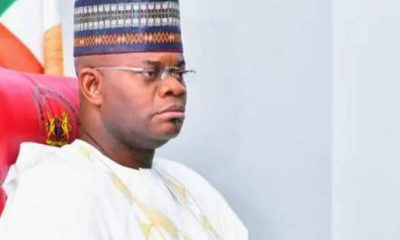National
Lagos resident claims ‘no more pregnant women’ amid school textbook abortion controversy

Nigeria is currently at a digital war following the exposure of abortion-related content in a Junior Secondary School (JSS3) science textbook, which has caused intense debate over the country’s educational system, moral values, and how financial hardship is influencing reproductive decisions.
The controversy started with a viral post on X (formerly Twitter) after user Alex Onyia shared excerpts from the Classic Basic Science and Technology for Junior Secondary School Three textbook.
The material in question explains the procedures and reasons for abortion and shows a detailed explanation of surgical abortion methods, including Dilation and Curettage (D&C) and Dilation and Evacuation (D&E), which immediately went viral.
Page 135 of the book partly reads, “There are two types of surgical abortion. Dilation and curettage (D & C): The cervix is dilated (opened and expanded) and a special instrument is used to scrape or scoop some linings and other materials in the uterus. D&C, also called vacuum aspiration, is used when the pregnancy is under 15 weeks.
“Dilation Evacuation (D & E): This involves dilating the cervix and using narrow forceps to evacuate the embryo that has formed bones. It is more difficult and requires more techniques than a simple D & C. It is used for 15-24 weeks old pregnancy.”
In his post, Onyia, however, accused the Nigerian Educational Research and Development Council (NERDC) of exposing children to inappropriate and harmful content.
“This book is teaching JSS3 students in Nigerian schools how to do abortion with clear images. Parents, wake up and save your children. NERDC approved this!” he wrote. “Corruption is not just about stealing money, it destroys our coming generation!”
The post has now quickly gathered a nationwide debate, with netizens flooding social media platforms with opinions, both in support and opposition to the textbook content.
For some, the inclusion of such detailed abortion procedures in a textbook for teenagers was a shocking violation of moral and cultural values.
Critics like @Danosquare decried what they called the infiltration of Western ideologies into Nigeria’s education system.”This is real evil, many people in Nigeria are actually ignorant of these wickedness from the West. If you talk, they’ll tag it CONSPIRACY THEORIES. Thank you Alex for raising this alarm.”
Mary Ekemezie, tweeting under the handle @MaryEkemezie, expressed her concern that parents were not paying close enough attention to the content being taught to their children.
Ekemezie described the situation as “one of the fall out of copying blindly from the West and depending on donor funding, and staffing the NERDC and the Nigerian Education with men and women who cannot see how bad books and corrupt content destroy the heritage of our nation.”
She added that she cannot help but weep, stating that “while parents are laser-focused on food the real tragedy will be losing your child to abortion and your sons being sterile because they choose vasectomy, before they even understood what that really meant. Wake up, before it is too late.”
Meanwhile, on the other side of the argument, some individuals defended the educational approach taken by the textbook.
Twitter users like @asquarebubble argued that teaching about abortion in a structured, academic environment does not encourage students to perform abortions but instead educates them about real-world issues they may encounter.
The user tweeted, “The illegality of illicit abortion doesn’t mean it can’t be taught in schools. Students aren’t being shown how to do it or participate in it, but learning the concept.It’s like lessons on sex, drug abuse, or crime—you don’t want them learning it outside a structured environment.”
While @LightskinMania views the situation as “the particular form of idiocy on the internet that infuriates me the most. Peddling rubbish narratives that affect human lives greatly because of a science textbook. The scale of anti-intellectualism in this country is probably why we’re not making it.”
The textbook, published by Thursmay Publishers and authored by M. Abdussalam, F.A Ibekwe, D.E Akintelure, and B.B Akintelure, is widely used in Nigerian schools and bears the approval stamp of the NERDC.
NERDC, among others, is responsible for overseeing the development and approval of educational materials, ensuring they align with national standards.
While some critics who side with Onyia call for a thorough review of the educational materials currently in use, with the argument that some content may be out of touch with Nigerian values and realities, others, like @Nwaulari, say, “Whoever is in charge of NERDC should be sacked immediately.”
Others even stated that the Nigerian education curriculum is borrowed; @Sir_Kings08 added “Our curriculum and everything is borrowed, so our school texts will naturally negate or contradict our values and heritage. Proprietors pride in adding “American”, “British” or “Canadian” to names of schs. Plus, a little bribe and no one has to waste time proofreading textbooks.”
Nigeria’s Criminal Code And Penal Code
Among other nations, like the United States, Nigeria has a strict legal framework around abortion. Abortion laws in Nigeria are highly restrictive, differing slightly between the northern and southern parts of the country.
The Penal Code, which mostly applies to northern states, allows abortion only to save the life of the mother and carries severe penalties for anyone found guilty of performing or procuring an illegal abortion. The maximum penalty for causing a miscarriage is 14 years in prison, while performing an abortion without the woman’s consent can result in life imprisonment.
In Section 232 of the Penal Code reads, “Whoever voluntarily causes a woman with child to miscarry shall, if such miscarriage be not caused in good faith for the purpose of saving the life of the woman, be punished with imprisonment for a term which may extend to fourteen years or with fine or with both.”
Section 235 says, “Whoever before the birth of any child does any act with the intention of thereby preventing that child from being born alive or causing it to die after its birth and does by such act prevent that child from being born alive or causes it to die after its birth, shall, if such act be not caused in good faith for the purpose of saving the life of the mother, be punished with imprisonment for a term which may extend to fourteen years or with fine or with both.”
Section 236 also stated, “Whoever does any act in such circumstances that, if he thereby caused death he would be guilty of culpable homicide, and does by such act cause the death of a quick unborn child, shall be punished with imprisonment for life or for a less term and shall also be liable to fine.”
Meanwhile, in other Nigerian states, governed by the Criminal Code, similar penalties apply. A person attempting to procure a miscarriage could face up to 14 years in prison, and any woman attempting to abort her own pregnancy can face up to seven years. Supplying drugs or instruments for an illegal abortion is also punishable by up to three years in prison.
Despite these harsh legal penalties, unsafe abortions remain a serious issue in Nigeria, largely due to limited access to legal abortion services and inadequate family planning resources.
According to a study by Boniface A. Oye-Adeniran and co., as many as 53 million pregnancies are estimated to be terminated by induced abortion each year worldwide, while in Nigeria an estimated 610,000 abortions are performed annually.
While the National Library of Medicine, in a study conducted in 80% of politicians and policy-makers interviewed admitted that unsafe abortion is a major cause of maternal mortality but only 20% favoured the amendment of the existing law.
The intersection of abortion education and Nigeria’s economic crisis has intensified public discourse, with some arguing that the government’s inability to alleviate poverty is forcing people to consider desperate measures, including unsafe abortions.
Nigeria for years has been dealing with rising inflation, which has severely impacted living conditions and family planning decisions. In August 2024, the National Bureau of Statistics (NBS) reported that the national average cost of a healthy diet had surged to N1,255 per adult per day, with Lagos, Ogun, and Rivers States recording the highest costs. Inflation reached 32.15% in August 2024, and food inflation spiked to 37.52%.
These economic difficulties have led some Nigerians to reassess their family planning choices, and abortion, though largely illegal, has become part of the conversation.
A Lagos resident, simply identified as Morenike, stated that she hardly sees on the street of Lagos now that the current financial hardship is influencing reproductive decisions.
“With the current high cost of living, people can barely afford to feed themselves, let alone bring a child into the world,” Morenike said. “I hardly see pregnant women on the streets these days; it’s so rare. The economic strain is just too much.”
Meanwhile, another Eko resident, identified as Itunu, stated that abortion is not hygienic and could create a mass practice that will not only shorten the lives of ignorant young ladies but will only increase the moral standard between the youths.
Itunu shared, “On abortion, I won’t support its encouragement; there are other ways to prevent having unwanted babies, such as family planning for those who are married, and abstinence which should be encouraged even more.
“Abortion is not hygienic and could create a mass practice which will not only shorten the lives of ignorant young ladies but will only increase the moral standard between the youths.”
As of the time of filing this report, neither the NERDC nor the Ministry of Education had responded to the situation.
You may like
-
Why I don’t trust any public institution in Nigeria – Fisayo Soyombo
-
Minimum Wage: Cross Rivers Workers to embark on indefinite strike
-
Naira Appreciates Against Dollar Amid Increased FX Supply
-
Tinubu Makes Historic State Visit to France as Macron Seeks Closer Economic Ties with Nigeria
-
Simon Ekpa’s Legal Troubles Deepen as Finnish Court Sets Date for Terror Charges
-
PMS Pricing: PETROAN Calls for Patience as NNPCL Prepares Official Announcement
-
Senate Plenary Erupts in Chaos Over Tinubu’s Tax Reform Bill
-
Tonye Cole Speaks on Petrol Selling Below N700 Per Litre
-
EFCC Detains Former Kogi Governor Yahaya Bello Over Alleged N80.2 Billion Money Laundering
-
Nigeria leads in Sub-Saharan Africa 2024 university rankings
-
NECO’s Global Presence Grows with Accreditation of Foreign Schools
-
PMS to reduce to N900 per litre – Marketers
National
ASUU decries number of first-class graduates from private universities

The Academic Staff Union of Universities (ASUU) has frowned at the “increasing numbers of first-class graduates” churned out annually by private universities in the country.
The ASUU National President, Prof. Emmanuel Osodeke, raised the concern on Thursday at an event organised by the body in honour of Prof. Andy Egwunyenga’s successful tenure as Vice Chancellor of Delta State University (DELSU).
The event took place at the DELSU campus, Abraka, Ethiope East Local Government Area of Delta.
Osodeke said that if public universities adopt the same practice without regulation, it could lead to the decline of genuine academic pursuits.
According to him, primary and secondary schools nowadays are producing graduates with excellent grades with insufficient knowledge.
The union leader also decried what he called “the mass exodus” of skilled Nigerian workers to nations perceived to be offering better work and living conditions.
He said that incidents like building collapse in the country indicated there were significant issues within the nation’s institutions.
“The struggle for academics to enjoy a decent standard of living saw some measure of successes in the past when academics could sustain a comfortable life.
“The situation has changed; the unions must return to the frontline for a renewed phase of their struggle.
“ASUU will consistently speak out against injustices and support fairness,” he said.
A member of the union, Prof. Omotoye Olorode, spoke on the topic: “New University Curricula (CCMAS): Context and Matters Arising” .
He said that the CCMAS functioned as an imperialistic mechanism aimed at disrupting the established academic structures in the country’s universities.
Olorode said this was designed to perpetuate a system, where Africans remain agricultural labourers to support the agricultural needs of developed nations.
“UNESCO recommends that 26 per cent of the nation’s budget should be allocated to education.
“Nigeria has never reached more than seven per cent, which reflects our stagnation and reluctance to facilitate growth in the education sector,” he said.
He congratulated the outgoing DELSU vice chancellor on a job well done.
The Chairman of DELSU ASUU, Dr Paul Opone, extended his heartfelt wishes to Egwunyenga.
He said that DELSU had been in dire need of a leader since 2019 to navigate the troubled waters caused by poor leadership.
He praised Egwunyenga for meeting the expectations of ASUU and the university community which, according to him, resulted in widespread celebration across all sectors of the institution.
“This is the first occasion where ASUU had to honour a lecturer at DELSU with such a celebration.
“Prof. Egwunyenga deserves far more than the praises he has received,” he said.
Responding, Egwunyenga expressed joy over the numerous accolades he received from across the three senatorial districts of the state.
He disclosed that his approach as vice chancellor was influenced by the narratives found in Festus Iyayi’s book, “Demons and Monsters”.
National
State police risky, expensive—Cattle breeders

The Kulen Allah Cattle Rearers Association of Nigeria ( KACRAN) has described the proposed state police as too expensive and risky to implement.
Alhaji Khalil Bello, KACRAN National President, said this in a statement in Damaturu on Friday.
He said the cost of establishing state police, depending on a state’s population, was between N10 billion to N30 billion, while monthly salaries and operational costs would gulp about N3 billion.
“These expenditures could divert critical resources from essential public services such as education, healthcare, and infrastructure, which are vital for the development and well-being of the region,” he said.
Bello said there were also concerns over abuse of state police by the politicians.
“There is a risk that these forces could be used to serve the interests of local political leaders rather than the broader public, leading to the victimisation of opposition parties and creating an environment of lawlessness and anarchy.
“Such a scenario could undermine the rule of law and erode public trust in law enforcement,” he said.
He recommended redirecting resources toward initiatives that would promote sustainable development and long-term prosperity for the country.
Bello listed the initiatives as including agriculture investment, youth employment, and industrial and infrastructure development.
The president also proposed the establishment of a security foundation fund in which monthly donation would be made to support the police.
“KACRAN calls on the Arewa Consultative Forum, the Northern Consultative Forum, emirs, and all northern leaders to oppose the establishment of state police.
“We believe that focusing on social services and economic development will yield greater benefits for the region than the creation of state police, which may ultimately exacerbate existing challenges.
“ By investing in sustainable initiatives, Northern states can create a more secure, prosperous, and harmonious society for all citizens,” he said.
National
Gov Okpebholo Suspends Recruitment Into State Civil Service

Edo State Governor, Senator Monday Okpebholo, has approved the suspension of recruitment into the state’s civil service until further notice.
The Governor has also ordered for a comprehensive review of all recruitment exercises carried out by the Godwin Obaseki-led administration between May-November 2024.
In a communication notice signed by the Secretary to State Government (SSG), Musa Umar Ikhilor on Friday, the Governor accused heads of various Ministries, Departments and Agencies (MDAs) of carrying out clandestine recruitment exercises into the State’s civil service.
The notice read: “The Governor of Edo State, His Excellency, Senator Monday Okpebholo is in receipt of report of the clandestine activities being perpetuated by some Commissions, Boards, Parastatals and Agencies of Government in the State.
“Preliminary investigation reveals that these bodies have continued to issue back dated letters of employment to their cronies without due process.
“For the avoidance of doubt, this Administration believes in the principle of fairness and equity which expects that all employment exercise should be merit based, competitive and accessible to all Edo indigenes.
“In light of the foregoing and in order to arrest this ugly trend, the Governor of Edo State, His Excellency, Senator Monday Okpebholo has directed the immediate suspension of all employment processes as well as the review of all appointments carried out since May, 2024 by Commissions, Boards, Parastatals and Agencies of Government.
“Heads of Ministries, Departments and Agencies are to note and comply with the above directive.”
Signed:
Fred Itua,
Chief Press Secretary to Edo State Governor
National
We’ll reintroduce rejected bills on 6-year single term—34 Rep. members

The 34 House of Representatives members who sponsored the bill to amend the 1999 Constitution to provide for a six-year single term for the president have resolved to reintroduce the bill.
Rep. Ikenga Ugochinyere (PDP-Imo) said this in a statement in Abuja on Friday, following the rejection of the bill on Nov. 21 during plenary.
The News Agency of Nigeria (NAN) reports that the bill sought the introduction of a six-year single term for the president, governors and local government chairmen.
NAN also reports that the bill sought zonal rotation of presidential and governorship seats, as well as holding all elections in one day.
Ugochinyere, however, said that all hope was not lost on the bill, as more consultations would be done.
The lawmaker, who is the lead sponsor of the bill, said that the decision on the floor of the house would not put an end to agitation and hope, insisting that the objective behind the bill would be realised.
“The struggle to reform our constitutional democracy to be all-inclusive and provide an avenue for justice, equity and fairness has not been lost.
“The decision on the floor of the house yesterday (Thursday) not to allow the bill for six-year single tenure and all elections to hold in one day will not end the agitation,” he said.
Ugochinyere described the rejection of the bill as a temporary setback that would not affect the campaign for an all-inclusive democratic process.
“We are going to review this decision and find possible ways of reintroducing it after, following due legislative procedures.
“All I can tell Nigerians is that we will continue the advocacy and convince our colleagues to see reason with us.
“If elections are held in one day, it will reduce cost and rigging.
“If power rotates, it will help de-escalate political tensions and six-year single term will go a long way in helping elective leaders to focus on delivering their democratic mandate,” he said.
National
Delta approves N713m for 2024 students bursary payment — Official

Gov. Sheriff Oborevwori of Delta has approved the sum of N713 million for the 2024 bursary award for 32,028 students in tertiary institutions in the country.
The Executive Secretary of the State Bursary and Scholarship Board, Dr. Godfrey Enita, disclosed this in a statement made available to newsmen on Thursday in Asaba.
According to Enita, the governor’s approval for the year 2024, the bursary award will cover students of state origin in public and private universities.
“It also covers students in polytechnics, mono-technics, colleges of education, schools of nursing science, and other tertiary schools, including military and paramilitary institutions.
He described the governor’s gesture as rare and uncommon and should be applauded.
“The governor demonstrates his magnanimity and goodwill towards the well-being of the Delta students and youths in general.
“It also underscores his commitment towards educational advancement through financial assistance to students in diverse forms and through massive infrastructural development in schools across the state.
“It is hoped, as always, that beneficiaries of the state’s financial assistance schemes will continue to be worthy ambassadors of Delta wherever they find themselves,” he said.
National
Survey shows 71% of households affected by food price hike

A new survey report just released by the National Bureau of Statistics (NBS) shows that the most prevalent shock affecting 71 per cent of households in Nigeria is price increases on major food items in the last 12 months.
The survey, 2023/24 General Household Survey-Panel, commonly called (GHS-Panel) Wave-5, is a follow-up to the 2018/2019 GHS Wave-4.
It seeks to enhance the understanding of household living conditions and provide government and other policymakers with reliable information for effective policy decision-making in Nigeria.
It specifically collects information on household income, assets and consumption, income-generating activities, health, education as well as shocks.
The survey conducted in collaboration with the World Bank and released yesterday in Abuja said 48.8 per cent of households surveyed reported that their main mechanism for coping with the increase in the prices of food items was reducing food consumption.
The report further said that 65.8 per cent of the households indicated being unable to eat healthy, nutritious or preferred foods because of lack of money.
The report also shows that 73.0 per cent of survey household members ages 10 to 19 were enrolled in school during 2018/2019 Wave 4 survey. But by 2023/2024 Wave 5 survey, the proportion of the people who were in school had decreased to 44.8 per cent, as 34.8 per cent of those previously enrolled were now out of school.
In the area of energy access, the survey shows that only 40.4 percent of households in rural areas had access to electricity compared to 82.2 per cent of urban households.
It also reports that many households lack toilet facilities and rely on tube wells or boreholes for drinking water. It noted that waste disposal is mostly informal, with 45.6 per cent using bushes or streets.
In his address during the launch of the report, the Statistician General of the Federation (SGF), Prince Adeyemi Adeniran, said the survey is a multi-topic data collection exercise that serves as an essential tool for capturing the dynamics of Nigerian households, providing invaluable insights into their economic activities, well-being, and resilience.
He said it is a longitudinal survey, meaning that it tracks and interviews the same respondents over time. “In the 5th Wave of the survey, approximately the same 5000 households have been followed and interviewed across five waves,” he said.
“This includes Wave One conducted in 2010/11, Wave Two in 2012/13, Wave Three in 2015/16, Wave Four in 2018/19, and now Wave Five conducted in 2023/24.”
He said available records indicate that, over the last five years, the survey findings have been used to design several projects and intervention programmes worth approximately $8.9 billion across many sectors which include Agriculture and Food, Education, Water, Social Protection and Jobs, Governance, and several others.
In his goodwill message, the World Bank’s Country Director for Nigeria, Dr Ndiame Diop, said the survey was important in understanding how Nigerian households responded to policy changes, crises and shocks.
Diop, who was represented by Vinay Vutukuru, Programme Leader, Sustainable Development, Nigeria, however, said the key thing was how the data would be used by ministries and stakeholders for effective policy formulation to achieve economic and sustainable growth.
He pledged the bank’s continuous support in working with the NBS to strengthen Nigeria’s statistical system.

2025: How To Plan A Budget For The Upcoming Year

Ruud van Nistelrooy Opens Up on Hurtful Manchester United Exit Before Taking Leicester City Job

Obasanjo would have died under Abacha if not for me -Gowon

Why I don’t trust any public institution in Nigeria – Fisayo Soyombo

Minimum Wage: Cross Rivers Workers to embark on indefinite strike

Bayer Leverkusen Forward Victor Boniface Faces Possible Sanction for Reckless Driving Incident

Radda approves N70,000 minimum wage for Katsina workers

PH refinery has not commenced bulk sales – NNPC

CBN issues Dec. 1, ultimatum against banks, ATM delays




















